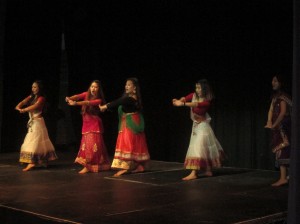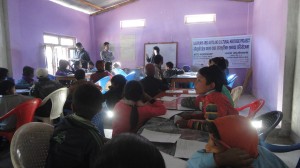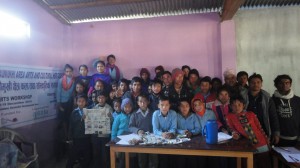The NIAP’s educational lobbying in both the UK and Nepal involves the following elements:
- Raising awareness about the differences and relationship between Nepali Arts and those of the Republic of India — in the UK (and broader West). Without such an awareness a proper appreciation of Nepal’s contemporary and ancient cultural heritage is impossible, and without this no effective profiling of UK Nepali community cultural heritage can take place, hampering community cohesion, and keeping the brilliancy of that heritage from being able to shine in the UK and be shared with the broader population
- Lobbying with Government of Nepal ministries, the UK Government, and INGO’s in Nepal with interests in the arts and arts related cultural tourism (research and on the ground support), to raise better awareness of the interconnection between Nepal’s creative community and enhancement of the national economy in the sector of cultural tourism
- In the UK lobbying to raise the profile of Nepali cultural heritage through the arts as an invaluable, important part of the UK’s multicultural heritage
- Providing an online platform in the English language, to support those in Nepal’s creative community that seek arts-related cultural heritage, and contemporary arts across all domains to be given a much higher priority in terms of funding and dedicated support from the Government of Nepal and all of the country’s political parties that have and cherish the realisation of Nepal, inclusive of all sections of the nation, proudly and effectively sharing its arts and artistic cultural heritage with the wider world
Some examples of the urgency and seriousness of these lobbying needs in both the UK & Nepal:
Sunil Pokharel, on the need for greater prioritisation of government support for theatre in Nepal
‘How do you look at the profile of Nepali theatre in the regional and international context?
In totality, we are not much ahead in the regional context. I am saying this in the sense that India, Bangladesh, and … Pakistan … have invested in theatres. Both the private or corporate sectors as well as the governments in the region have invested in this sector. We are lagging behind them because of the lack of a culture that promotes theatre. The quality of our work is good, though…’
Source: Interview with Sunil Pokharel in the ‘Nepali Monitor’
In 2014 the National UK Nepali Inter-Uni Dance Competition was held in Bournemouth, with more than 12 UK university Nepalese students societies competing, with more than 200 UK Nepali international students and dancev teachers attending, and a judges panel of nationally and internationally recognised experts overseeing the incredible range of high quality performances by the competing teams. This event was of National importance in the UK, for celebration of the UK Nepali population, yet despite excellent coverage in the Nepali media, it received scant to non-existent coverage in the mainstream UK media; this despite considerable efforts made by the UK Nepal Friendship Society to represent this locally.
In Mid-December 2014 an NIAP facilitated arts educational workshop (supported and coordinated by a local area community support and representational organisation, UNESEEN) was held in Pyuthan, centre of the Gaumukhi Development Area in Western Nepal. The purpose of the workshop was two-fold:
- To educate the local people, both young and old, on what the arts were and what handicrafts were — for except for a very small number, none of the inhabitants of the area knew what these were in any practical and meaningful sense (despite practicing or being aware of them: areas of Nepal that have such awareness are successful in terms of interacting with international visitors and benefiting economically from cultural tourism) — so that they could understand what they were and meant in terms of their day to day practical and also recreational activities
- To provide to the local people, especially youth and to both male and female participants in the arts learning workshop, the once in a lifetime experience of spending a few hours painting, drawing and even producing some Origami under the guidance of the two NIAP arts teacher volunteers that had travelled all the way from Kathmandu to provide this experience. In not a few areas of Nepal and in particular social classes, to take up art is regarded as a gross dereliction of duty from time that should be spent, especially by girls, on manual labour
These are just three examples of the educational lobbying dimension of the NIAP, that is so needed in both Nepal and the UK.



